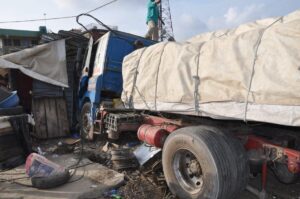
2021 LPG week: FG needs over $410bn investment for energy transition — Osinbajo
…Says investment plan will solve clean cooking challenges
By Abimbola Abatta and Uthman Salami
Vice President, Yemi Osinbajo has revealed that the Federal Government requires investment of about $410 billion to sustain Nigeria’s energy transition plan.
The VP equally noted that the investment plan will play a critical role in addressing the challenges of clean cooking, while saying it will cut emissions by 30 per cent and reduce other pollutants by at least 90%.
Osinbajo said this in his address on Tuesday at the World Liquified Petroleum Gas Association (WLPGA), week-long forum, holding in Dubai, United Arab Emirates.
The 2021 LPG Week brings together over 2,000 delegates from 72 countries, including major LPG companies, senior public sector officials, industry experts and other relevant stakeholders.
According to him, the Nigerian government’s integrated energy plan with a clean cooking model provides an opportunity to transition at least five million households to LPG solutions.
Osinbajo, who spoke on the theme: “Energizing Tomorrow” at the Dubai World Trade Centre, said that it was “worrying that a growing number of wealthy nations have banned or restricted public investment in fossil fuels, including natural gas.”
He, maintained that “Such policies often do not distinguish between different kinds of fossil fuels, nor do they consider the vital role some of these fuels play in powering the growth of developing economies, especially in sub-Saharan Africa.
“As development finance institutions try to balance climate concerns against the need to spur equitable development and increase energy security, the United Kingdom, the United States, and the European Union have all taken aggressive steps to limit fossil fuel investments in developing and emerging economies.
“The World Bank and other multilateral development banks are being urged by some shareholders to do the same.
“The African Development Bank, for instance, is increasingly unable to support large natural gas projects in the face of European shareholder pressure,” he added.
Prof. Osinbajo noted that about 600 million Africans do not have access to electricity, adding that “for developing countries, unlike the rest of the world, the transition to net zero emissions poses two existential problems.
“For the few with access to electricity, it is either unreliable due to lack of generating capacity and infrastructure, or unaffordable due to high prices. But a more important aspect of that problem is the 2.6 billion people globally without access to clean cooking solutions, including over 900 million in Africa.
“In fact, this energy-poverty nexus has distinct gender characteristics. A report from the World Health Organization revealed that about 4.3 million people die annually from inefficient cooking practices using polluting stoves paired with solid fuels like charcoal and kerosene. So, clearly there is an urgent need to transition from these fatally hazardous fuels to cleaner energy,” he added.
While citing Nigeria’s efforts at balancing energy security with environmental sustainability, he said, “The Federal Government has developed an Energy Transition Plan which shows that achieving net-zero by 2060 will require investments of about $410 billion, above business as usual, and that natural gas will play a critical role in addressing the clean cooking challenge, as well as providing grid stability to integrate renewables at scale.
“Nigeria has also developed an integrated energy plan with a clean cooking model which shows the clean cooking opportunities across technologies such as electric- cooking and LPG.
“This model shows that there is an opportunity to transition at least five million households to LPG solutions, which will cut emissions by 30% compared to business as usual, reduce other pollutants by 90% or more and avoid 6.9 billion kilogrammes of forest loss from biomass collection.
“LPG remains an ideal fuel to support the journey to renewables, as it is easily stored, does not degrade over time, requires no heating or complex filtration to keep the fuel in a usable condition, and does not constantly boil off.
“For a gas-rich country like Nigeria with over 206 TCF of proven reserves and an additional 600 TCF scope to be proven, “it is evident that what makes the most sense from the point of view of balancing energy security with environmental sustainability is the use of LPG at least as a transition fuel.
“For countries such as my own, rich in natural resources but still energy poor – from the point of view of access, the transition must not come at the expense of affordable and reliable energy for people, cities, and industry. On the contrary, it must be inclusive, equitable, and just—which means preserving the right to sustainable development and poverty eradication as enshrined in global treaties such as the Paris accord.”
Referencing Nigeria’s Energy Transition, the VP observed that the plan is tied to adopting and domesticating all forms of cleaner energy.
He state that “these cleaner energy systems include solar for electricity, waste to energy, wind energy, hydro power and natural gas, which aim to adopt and domesticate all forms of cleaner energy sources from household use to commercial use.”
The Vice President amplified his points by highlighting proactive policies and plans of the Federal Government since 2017, noting the implementation of Nigeria’s Domestic LPG expansion initiatives, including the LPG policy as part of its National Gas Policy; the National Gas Flare Commercialization Programme; as well as specific provisions in the new Petroleum Industry Act (PIA) 2021 that elevates LPG as the fuel of choice compared to other competing fuels.
“And we have established a 20 million Cylinder Injection Scheme; 5-10 million of these are to be introduced in pilot States next year. We have also established an LPG Energy Fund in the order of $50 million, in its first phase, in partnership with AFREXIMBANK,” he disclosed.
He also listed the mandated conversion of 58,000 Telecommunications cell sites from diesel to LPG due to identified emissions from the industry and an Autogas conversion scheme and capacity building in the 12 pilot States.
He explained that the FG has “consummated collaboration with the EU through a study on CO2 savings based on the National LPG Expansion Implementation Programme for Clean Cooking. Also in the last three years, several LPG coastal terminals have been opened in Lagos, Warri, Port Harcourt and Calabar, with the latest one opening in Warri later this month.
“We also have a waiver of import duty on machineries, equipment and spare parts for the establishment of LPG plants for 10 years (subject to renewal) and a 5-Year Tax holiday for investors in the LPG value Chain.
“Nigeria’s interventions would result in significant reduction in the rate of deforestation and create millions of direct and indirect employment opportunities for Nigerians.
“LPG is set to be part of the destination as it is being used as a precursor for green hydrogen with zero emission,” adding that “an eventual move to bio-LPG will allow countries like Nigeria to keep existing infrastructure in place, capitalise on already existing supply and distribution chains and reach net-zero at far lower cost.
“This also helps to overcome the concern of stranded assets. Consumers will not have to re-invest in expensive electrical solutions if their gas appliances can be re- purposed for zero carbon LPG.
“Our target is 5,000,000MT, and this requires at least USD$6 billion for the required LPG infrastructure roll-out to meet our target. From inland and coastal terminals to cylinder filling plants, bobtails, semi-trailers, valves and regulators, Nigeria presents a unique LPG investment destination for setting up manufacturing facilities and support services for the expanded LPG value chain in the National LPG Expansion.”



